By carefully evaluating each option and tailoring your approach to your unique situation, you can make a choice that’s right for you and pave the way for lasting financial well-being.
Facing financial challenges can be overwhelming. While bankruptcy may seem like the only solution, exploring alternatives before filing is crucial. This guide provides insights into various bankruptcy alternatives, offering a comprehensive understanding of options to consider on your path to financial recovery.
Negotiate with Creditors
Before considering bankruptcy, initiate direct communication with your creditors. Many creditors are willing to negotiate terms, such as reduced interest rates, extended repayment periods, or even settling for a lower amount. Explain your financial situation honestly and seek feasible arrangements to alleviate the burden without bankruptcy.
Debt Consolidation
Consolidating debts involves combining multiple debts into a single loan with a lower interest rate. This option simplifies payments and reduces the overall interest paid. You can achieve debt consolidation through personal loans, balance transfer credit cards, or debt consolidation programs. It provides a structured approach to managing debts without the implications of bankruptcy.
Credit Counseling
Enrolling in credit counseling programs can be a proactive step. Non-profit credit counseling agencies, such as those affiliated with Wonais Law, offer guidance on budgeting, debt management, and negotiating with creditors. A certified credit counselor can help create a debt management plan tailored to your financial situation, facilitating a more structured and manageable repayment process.
Debt Settlement
Debt settlement involves negotiating with creditors to accept a lump-sum payment for less than the total amount owed. This option is suitable for individuals with significant debt but may impact credit scores. Working with reputable debt settlement professionals ensures a strategic approach and fair negotiations, minimizing potential negative consequences.
Explore Government Assistance Programs
Depending on your financial circumstances, you may qualify for government assistance programs. These programs can include debt relief initiatives, housing assistance, or unemployment benefits. Research available local, state, or federal options to identify potential support that can alleviate financial strain.
Legal Assistance
Consulting with an attorney specializing in debt and financial matters can provide valuable insights. Legal professionals can review your situation and explore various avenues to address debt challenges. They may identify potential defenses against creditor actions, negotiate settlements, or guide you through alternative legal processes to avoid bankruptcy.
Income-Driven Repayment Plans for Student Loans
Explore income-driven repayment plans if student loans are a significant part of your debt. These plans adjust monthly payments based on your income and family size, offering more manageable repayment terms. This can prevent bankruptcy, specifically due to overwhelming student loan debt.
Sell Assets Strategically
Consider selling non-essential assets strategically to generate funds for debt repayment. Evaluate possessions such as unused jewelry, electronics, or other valuable items that can be liquidated to address outstanding debts. This approach allows you to take control of your financial situation without resorting to bankruptcy.
Financial Education and Counseling

Investing in financial education and counseling provides essential tools for managing money and debt effectively. Attend workshops, online courses, or seminars on budgeting, financial planning, and debt reduction strategies. Equipping yourself with financial knowledge enhances your ability to navigate challenges and make informed decisions.
Emergency Savings Fund
Building an emergency savings fund is a proactive measure against future financial crises. Having savings to cover unexpected expenses reduces reliance on credit and minimizes the risk of accumulating overwhelming debt. Establishing and consistently contributing to an emergency fund is a long-term strategy to prevent financial hardships.
Informed Decisions for Financial Well-Being
Before considering bankruptcy, exploring alternative options is essential for making informed decisions about your financial future. Whether through negotiations with creditors, debt consolidation, or legal assistance, these alternatives provide pathways to regain control over your finances.
By carefully evaluating each option and tailoring your approach to your unique situation, you can make a choice that’s right for you and pave the way for lasting financial well-being.


Join the conversation!